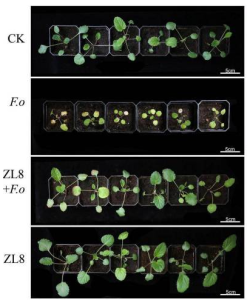A group from School of Pharmaceutical Sciences, Peking University, Beijing, China, etc. has reported about mycorrhizal bacteria strains isolated from Polyporus umbellatus.
https://www.ncbi.nlm.nih.gov/pmc/articles/PMC9340266/
Fungal pathogens cause a range of serious plant diseases, such as Fusarium wilt, and are responsible for most of the diseases in agricultural ecosystems.
There are two main ways to deal with the effects of these diseases:
One is to develop disease-resistant plants, and
the other is to use chemical fungicide to control the spread of pathogens.
However, these two methods have the disadvantages of long cycle and drug resistance of pathogens. A practical and sustainable strategy for dealing with phytopathogenic fungal diseases is therefore the application of biological control agents (BCAs).
Several bacteria have been isolated from plants and fungi, most of which belong to the genera Bacillus and Pseudomonas, and it has been demonstrated that those genera exhibit satisfactory biological activity and marked biocontrol potential.
In this paper, 21 rhizobacteria strains were isolated from mycorrhizal samples of Polyporus umbellatus, and evaluated from viewpoints of agricultural sustainability without requiring the overuse of hazardous fungicide and plant growth promoting ability such as producing IAA, siderophore, etc. and dissolving phosphate.
Among those isolated strains, it was found that the Pseudomonas strain ZL8 shows the highest performance as plant growth-promoting bacteria (PGPB). Nineteen compounds were identified from the fermentation broth of the strain ZL8, of which 2,4-diacetylphloroglucinol (DAPG) showed a significant inhibitory effect on phytopathogenic fungi with a minimum inhibitory concentration of 3.12–25 μg/mL. The plant growth promoting ability was evaluated with using Salvia miltiorrhiza, and the effect was so significant as shown below.

